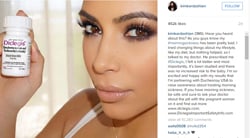 |
| Kim Kardashian promoting Duchesnay's morning sickness drug, Diclegis, on Instagram. |
The "Kardashian Effect"--it's a term to describe the way reality TV's Kardashian family, especially daughter Kim, influences beauty and fashion trends. Now, the Kardashian Effect has come to pharma.
Kim's Instagram post in July praising morning sickness drug Diclegis not only grabbed the FDA's attention, but got many Kardashian fans talking about the drug. By the time the FDA shut down Diclegis maker Duchesnay's approved celeb endorser in early August, half a million Diclegis mentions were already floating around on social media.
That's a lot of talk. And potentially a lot of pressure on physicians when the Kardashian faithful come in for a pregnancy check-up and ask for a script for their idol's preferred anti-nausea medication.
While there's no evidence that it's started to happen yet with Diclegis, social media is definitely in play when it comes to patients asking doctors for specific branded drugs. Almost 37% of physicians have fielded patient requests for specific meds fueled by information a patient saw in social media marketing, including disease awareness campaigns, according to a custom survey of 1,417 physicians by Sermo for FiercePharmaMarketing.
Several doctors also commented on the question, including one family practitioner who hadn't fielded any such requests. "Not had any patients ask for celebrity-advertised meds that I am aware of (not that many would advertise where they got the idea anyway)," the doctor said. Some 57% of surveyed docs said they hadn't been asked, while the remaining 6% replied that they didn't know.
Pharma companies in general have shied away from aggressive marketing in social media, but that's where consumers--and potential patients and customers--are these days. And as the first rule of fishing says, you've got to go where the fish are.
According to Justin Freid, VP of search engine marketing and emerging media at CMI/Compas, there were 5.2 million social media conversations about diabetes alone in the past six months. Asthma and HIV added another 1.1 million and 3.9 million, respectively.
"With communities forming across multiple networks such as Facebook, Twitter and other disease-state focused networks, patients are coming to the conversation armed with more information than ever before," Freid said in an email. "HCPs need to keep up with what is going on, what news is being shared so they can have conversations with their patients."
With or without the attention of celebrities like Kardashian, social media will continue to influence patients who will then turn to their doctors with questions. So the more important question might not be will the Kardashian Effect come to pharma, but are healthcare providers ready for it?
Special Report: Top 10 pharma companies in social media